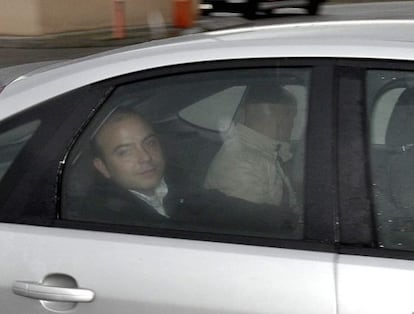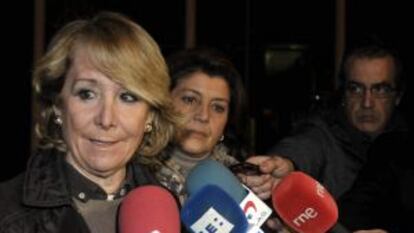Carromero begins prison life in Madrid, but will it be for long?
Party activist returns from Cuba after being sentenced for causing deaths in car crash

Ángel Carromero, the PP activist jailed in Cuba in connection with a road accident that resulted in the death of prominent dissident Oswaldo Payá, has been sent back to Spain to serve the rest of his four-year sentence.
The 27-year-old was taken to a jail in Segovia, north of Madrid, on Saturday in pursuance of a bilateral agreement on the execution of penal sentences between Spain and Cuba.
Carromero, a leader of the PP's New Generations youth wing, was at the wheel of a rental car that crashed on July 22 near the eastern Cuban city of Bayamo. Also in the car were Harold Cepero and fellow dissident Payá, 60, who both were killed when the car span off the road and crashed into a tree.
Another of the passengers was Swedish Christian Democrat Jens Aron Modig, who, like Carromero, suffered light injuries, but was authorized to leave the island several days later.
The PP has said he can continue in his job as an adviser at Madrid City Hall
An investigation by the Cuban authorities showed that Carromero was speeding at the time of the crash on a stretch of road that was being repaired.
Carromero and Modig had travelled to Cuba as tourists, but planned to meet with the opposition to Cuban President Raul Castro. As head of the dissident Christian Liberation Movement, Payá waged a long-running campaign of legal initiatives to reform communist Cuba. He was nominated several times for the Nobel Peace Prize and in 2002 was awarded the European Parliament's Sakharov Prize for freedom of thought.
"There is no such thing as justice in Cuba"

After talking with Carromero for an hour on New Year's Eve, Esperanza Aguirre insisted to reporters that he was not a criminal, and that at the time of the accident he was still in possession of a driving license. A ban came into effect on October 5 after he accumulated 12 points on his license for speeding offenses.
The former head of the regional government of Madrid added that the families of the deceased had not brought charges against Carromero, and that the Cuban authorities had targeted him.
"There is no such thing as justice in Cuba, the country is a tyranny, and the regime there has been oppressing its people for the last 54 years," she said. "We had no choice but to accept the sentence handed down by the Cuban courts in order to get him back home to Spain."
Aguirre said that she was "enormously happy" that Carromero was back in Spain, and congratulated the government for getting him back. "The suffering that you have endured by this communist dictatorship will strengthen you and stiffen your resolve to defend liberty. All your friends and companions support you and we are sure that you will return home in a few days. In the meantime, we have to make it known that you still had a driving license at the time of the accident, and that an unintentional accident in Spain does not constitute a crime," Aguirre wrote in an open letter to Carromero.
On New Year's Eve, Esperanza Aguirre, the former head of the PP-controled regional government of Madrid, met with Carromero. She has called for an international investigation into the deaths of Payá and Cepero.
Aguirre told journalists that she believed Carromero was tortured by police in Cuba, saying that she found him "very deeply affected by his experience."
"I think that I have helped him, and he is grateful, and when he has got things in order, because he is going through a very tough time, he will tell us what really happened," she told the press.
Aguirre said that Carromero had told her that until November 14, he had only been allowed out of his cell every 15 days. "He was kept sedated - which I would call torture - for two weeks," said Aguirre.
She said that she had not been aware at the time of Carromero's visit to Cuba, but that New Generations was part of an initiative by the Youth League of the Swedish Christian Democrat Party - whose president, Jens Aron Modig, was involved in the accident - to support the Cuban opposition.
Carromero's mother visited him on Saturday, leaving him books by Soviet dissident Natan Sharansky, along with speeches by Winston Churchill.
Carromero will be among 13 prisoners kept in the newcomers' unit, with a cell to himself. He will be assigned cleaning and administrative tasks. The prison was opened in 2000 and has six units housing 450 prisoners.
Under Spanish law, involuntary manslaughter behind the wheel is punishable by a maximum two-year sentence. Carromero is likely to be eligible for early release.
His cause will be aided by the fact that on Monday, the Popular Party announced that he will be able to continue in his job as an adviser at Madrid City Hall.
PP Congressman Pablo Casado told EL PAÍS that Carromero's defense lawyer had proof that his client was not speeding at the time of the accident. He says that the car was within the 70 km/h limit, and that the accident took place because of poor road conditions that were not signposted. He added that the defense team had not been allowed to examine the vehicle.
Cuban investigators calculated that the car had travelled a distance of about 800 kilometers in less than eight hours.
The investigative team said that based on their analysis of the scene, and taking into account the statements given by witnesses and the survivors, the car must have been travelling at more than 120 km/h.
The team said that "lack of attention controlling the vehicle, excessive speed, and the incorrect decision to apply the brakes abruptly on a slippery surface caused this tragic accident, which cost the lives of two human beings."
Prior to the release of the report, Payá's son said that his father had received numerous death threats, and that his car may have been forced off the road. Carlos Payá, Oswaldo's brother, is maintaining his allegations that it was not a one-car accident, and that a red Lada driven by Cuban government agents followed Payá's car, rammed it, and caused the crash.
Payá, 60, was the founder of the Varela project, a campaign begun in 1998 to gather signatures in support of a referendum on laws guaranteeing civil rights. In May 2002, he presented Cuba's National Assembly with a petition of more than 10,000 signatures calling for an end to four decades of one-party rule.







































